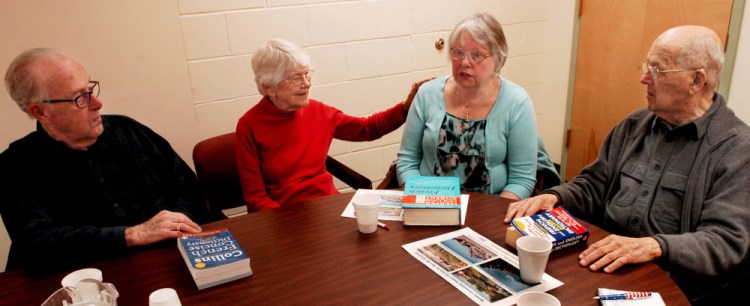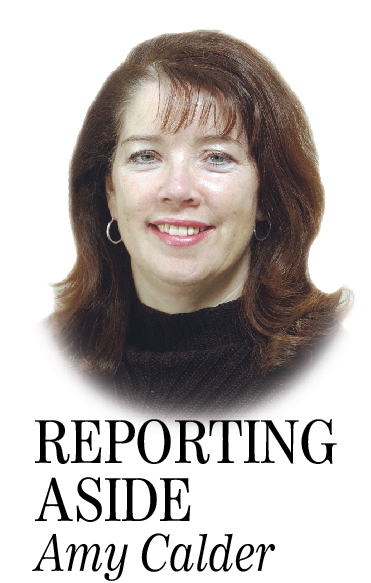CECILE VIGUE, 94, recalled growing up in Waterville’s South End in the area of the city known as The Plains.
“I lived on Water Street. It was not a popular place. I got laughed at very much because I was French.”
Her family had moved to the U.S. from Canada when she was 6. French was her first language, and she did not start speaking English until she went to school. French was not popular among English-speaking people, she said.
Now, many years later, the tides have changed. Those whose first language was French are resurrecting it, getting together to speak French and enjoying being able to revel in it.
“It’s a beautiful language,” Vigue says. “It’s one of the romantic languages. I’m proud to be a Franco-American. I’m proud to speak two languages. I have an accent, but I don’t care. I still can speak two languages. A lot of people can’t.”
A vibrant, upbeat woman, Vigue was conversing in a group that meets weekly at Senior Spectrum’s Muskie Center in Waterville to speak French and socialize. They meet at 9:30 a.m. Wednesdays and have their own little room where they sip coffee and eat muffins as they converse in French.
On this particular Wednesday, they spoke some English for my benefit, but typically they speak mostly French for the hour-long meeting, they said.
The group was small — four people — because some members had health issues or family commitments. There was Vigue, of Fairfield Center; Lucien Veilleux, 92, of Waterville; Gerry Michaud, 88, of Winslow; and Claire Ryan, 67, of Oakland.
“We talk about current events and recall outings and things that come up,” Ryan said. “Sometimes nature — we talk about sightings of woodpeckers and other birds.”
It was a lively group and the members were enjoying each other’s company. Vigue and Veilleux said French was spoken in their homes when they were children and English was their second language. Michaud said his family spoke mostly English at home. Ryan, who was born and raised in Montreal, spoke English in the home, but lived in a French neighborhood.
“Montreal is more French-speaking than English because all immigrants have to go to French school,” she said. “It was more bilingual when I was growing up. It was always something I lamented, not speaking French, because I lived in a French neighborhood and I always wanted kids to play with.”
She said refugees to Canada are placed in French schools, as the government is doing everything it can to encourage the French language.
“When I was going to school, there were English and French schools. Now English is only taught in private schools. I wish I had gone to French school. Canada values refugees and immigrants. It doesn’t try to limit immigrants because, frankly, a lot of Canada is uninhabited, tundra and above. They do need taxpayers to support programs. They do encourage immigration.”
Michaud recalled growing up in the 1930s and ’40s.
“It wasn’t popular being French. My parents were both French-speaking, but we spoke mostly English at home. They developed English without any accent at all. That was more popular than French, but that’s changed.”
Retired from the sales department at Keyes Fibre Co., now Huhtamaki, Michaud said he took French through high school and college. He spent some summers as a child in Upper Frenchville, where his father was born, and he learned a lot of French there.
Veilleux, a retired surgeon, grew up in an English neighborhood, so he picked up English quickly. “We spoke French in the house all the time,” he said.
Michaud asked Veilleux if any of his children became doctors, as he did.
“Avez vous les enfants qui sont medicins?” Michaud said
“Non, j’ai une fille qui est une infirmiere,” Veilleux replied, saying his daughter is a nurse.
Vigue stayed home to raise her children, but when the children were older, she worked part-time at Chi-Rho, a store on Main Street in Waterville that sold religious articles and women’s clothes, she said. She recalled that many years ago most store clerks in Waterville spoke French and English. Later, she volunteered at the local hospital 28 years and stopped only when her husband got sick. He passed away earlier this year.
Ryan raised five children while also operating day care centers and later got her master’s degree in counseling and worked in a battered women’s shelter. She left Montreal in 1969 and lived in South Dakota 45 years before moving to Maine a year ago with her husband to be near their daughters and grandchildren.
Speaking in French, the group discussed the name “Veilleux” with Ryan consulting the French dictionary to find its meaning. “To stay up, to be watchful, to stand guard, a watchman, a sentinel,” Ryan read aloud.
Vigue said her last name is an Anglicized version of Veilleux. Her maiden name was Poulin. She said, “A lot of people have changed that to Pooler. My father-in-law changed his last name from Veilleux to Vigue.”
They spoke of their Canadian roots and their ancestry in France.
“We stand on the shoulders of our ancestors,” Claire said.
Active about a year, the group welcomes new members. They said anyone interested in attending may just show up at 9:30 a.m. Wednesdays at the Muskie Center.
“We start lapsing into English and someone will say, ‘Well, what’s that in French, please?'” Ryan said.
Members learn a new word every time they meet, according to Vigue. She hopes more people will join the group.
“We’re like a family,” she said.
Amy Calder has been a Morning Sentinel reporter for 28 years. Her column appears here Mondays. She may be reached at acalder@centralmaine.com. For previous Reporting Aside columns, go to centralmaine.com.
Send questions/comments to the editors.




Comments are no longer available on this story